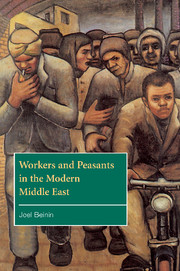Book contents
- Frontmatter
- Contents
- List of tables
- Acknowledgments
- Glossary
- List of acronyms and abbreviations
- Map 1: The Ottoman Empire, 1699–1914
- Map 2: Egypt and Bilad al-Sham
- Map 3: The Middle East in the twentieth century
- Introduction
- 1 The world capitalist market, provincial regimes, and local producers, 1750–1839
- 2 Ottoman reform and European imperialism, 1839–1907
- 3 The rise of mass politics, 1908–1939
- 4 Fikri al-Khuli's journey to al-Mahalla al-Kubra
- 5 Populist nationalism, state-led development, and authoritarian regimes, 1939–1973
- 6 Post-populist reformation of the working class and peasantry
- Notes
- References
- Index
3 - The rise of mass politics, 1908–1939
Published online by Cambridge University Press: 03 February 2010
- Frontmatter
- Contents
- List of tables
- Acknowledgments
- Glossary
- List of acronyms and abbreviations
- Map 1: The Ottoman Empire, 1699–1914
- Map 2: Egypt and Bilad al-Sham
- Map 3: The Middle East in the twentieth century
- Introduction
- 1 The world capitalist market, provincial regimes, and local producers, 1750–1839
- 2 Ottoman reform and European imperialism, 1839–1907
- 3 The rise of mass politics, 1908–1939
- 4 Fikri al-Khuli's journey to al-Mahalla al-Kubra
- 5 Populist nationalism, state-led development, and authoritarian regimes, 1939–1973
- 6 Post-populist reformation of the working class and peasantry
- Notes
- References
- Index
Summary
The accelerated global circulation of capital, commodities, people, and ideas induced by the mid-Victorian economic expansion persisted through the Great Depression of 1873–96 until the start of World War I. However, the confluence of the London-centered recession of 1906–08 and the inauguration of the era of mass politics marks a divide in the period for the purposes of this book. Through collective actions precipitated by the Young Turk uprising against Sultan Abdülhamid II on July 23, 1908, the June 1906 Dinshaway incident in Egypt, and the 1905–06 Constitutional Revolution in Iran, Middle Eastern workers and peasants established a more salient presence and discursive legitimacy in the world of politics than had previously been the case. These events, their repercussions, and their international context constituted new and sometimes competing, sometimes overlapping social categories of citizen, worker, farmer, and believer that hailed subalterns as modern, national, political subjects.
Resumption of direct capital investment and increased market demand in the 1890s integrated parts of the Middle East even more closely into the world capitalist market. European capital created new, large-scale enterprises with large concentrations of wage workers in transportation, urban services, and a few manufacturing industries and became more actively engaged in expropriating and reconfiguring the peasantry. Concurrently, many middle-strata urban professionals educated in a western style adopted European conceptions of modernity and progress encompassing science, technology, education, social reform, and cultural revival. This was a newly constituted status group termed the effendiyya in Egypt and the mutanawwirun (men of enlightenment) in greater Syria.
- Type
- Chapter
- Information
- Workers and Peasants in the Modern Middle East , pp. 71 - 98Publisher: Cambridge University PressPrint publication year: 2001



